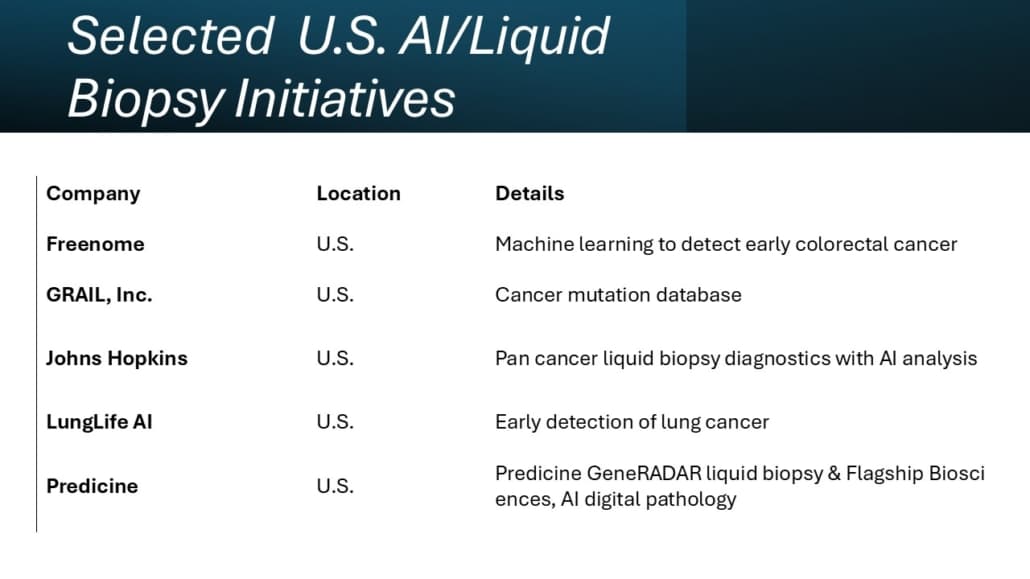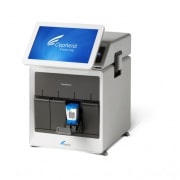IVD Trends to Watch: Artificial intelligence (AI) Use in U.S. Liquid Biopsy Market
In a rapidly evolving healthcare landscape, staying ahead in the field of in vitro diagnostics (IVD) is more crucial than ever. This blog delves into key insights from Kalorama Information’s latest market research report, In Vitro Diagnostics (IVD) in the United States: Comprehensive Market Overview 2024-2029. As the fifth installment in Kalorama’s North American IVD series, this report builds on decades of expertise, complementing their flagship publication, The Worldwide Market for In Vitro Diagnostic (IVD) Tests, now in its 17th edition. Join us as we explore the trends, innovations, and market dynamics shaping the future of IVD in the U.S.
BLOG
Artificial intelligence (AI) is making significant strides in the field of liquid biopsy, as highlighted in Kalorama Information’s latest market research report, In Vitro Diagnostics (IVD) in the United States: Comprehensive Market Overview 2024-2029. AI systems, which mimic human intelligence through learning, reasoning, and self-correction, are proving to be highly effective in diagnostics and surgical interventions.
Specifically, AI is transforming liquid biopsy in in vitro diagnostics (IVD) by enhancing early disease detection, real-time monitoring, and personalized medicine. By analyzing biomarkers such as circulating tumor DNA (ctDNA) and extracellular vesicles (EVs) from non-invasive samples like blood, AI-driven algorithms improve data analysis and predictive accuracy. These advancements enable precise identification of complex genetic and molecular patterns, facilitating early cancer detection, minimal residual disease (MRD) tracking, and drug resistance monitoring. Additionally, AI optimizes workflows by automating data interpretation, reducing manual errors, and speeding up result delivery. AI also advances technologies like next-generation sequencing (NGS) and mass spectrometry, broadening liquid biopsy applications to neurological and cardiovascular diseases.
Nevertheless, developers emphasize that AI will not replace doctors entirely, as the doctor-patient relationship remains irreplaceable.
The Evolution of Healthcare and AI
The healthcare industry has undergone a major transformation, moving from paper-based records to electronic systems and incorporating advanced digital health monitoring devices. This shift has led to a data explosion, which AI technology is uniquely equipped to handle. The primary goal of AI in healthcare is to enhance patient care while reducing costs and administrative burdens.
Support for AI in Healthcare
In January 2019, the Alliance for Artificial Intelligence in Healthcare (AAIH) was established to promote AI development and implementation in healthcare. This multi-stakeholder non-profit organization includes technology developers, pharmaceutical and device companies, research organizations, and other associations. The AAIH aims to educate the public about AI’s benefits and risks, promote investment in AI research, and work with government officials to develop regulatory standards.
Regulatory Challenges
Regulating AI in healthcare presents unique challenges due to the diverse applications and rapid innovation in the field. AI is being used in various segments such as clinical decision support, utilization review, reimbursement, and research, each with different regulatory risks. The lack of a unified regulatory framework and the “black box” nature of many AI technologies further complicate regulation.
Recent AI Innovations in Healthcare
Several AI-driven healthcare solutions have recently been launched:
- Infermedica: AI-Driven Medical Guidance Platform with new modules and features.
- Cornerstone: AI platform for automated data cleaning and preparation.
- Vital: Care Adviser, a next-generation inpatient digital health solution.
- Caption Health: Caption AI technology platform for improved heart ultrasound access.
AI’s Potential in Oncology
Oncology faces two major challenges: early cancer detection and precision targeted cancer care. AI algorithms complement liquid biopsy by detecting cell-free and tumor DNA in blood samples. These algorithms can process large amounts of data and identify patterns faster and more accurately than human doctors. Although AI algorithms have performed well in clinical validation studies, none have yet been approved for clinical use.
Promising Developments
- GRAIL: Conducting large-scale studies using machine learning to create a library of healthy and cancer mutations, aiming to develop a blood test for early cancer detection.
- LungLifeAI: Focused on early lung cancer detection using AI-enhanced blood tests.
- Predicine and Flagship Biosciences: Combining molecular insights and AI-enabled digital pathology for comprehensive biomarker profiling in immuno-oncology.
- ADLM 2024: At the 2024 ADLM meeting this past summer, experts showcased the transformative role of AI in healthcare. Discussions spanned from advancing personalized medicine and improving clinical decisions in mass spectrometry to leveraging multiplexed genomic sequencing and human brain organoid technology. Another key focus was on building trust in AI-driven healthcare, addressing the skepticism that still exists. ADLM is formerly the AACC Annual Scientific Meeting & Clinical Lab Expo.

For More Information
Purchase In Vitro Diagnostics (IVD) in the United States: Comprehensive Market Overview 2024-2029 for more insights and information.
Here’s a look at what’s in the report beyond research on liquid biopsy and AI:
- Comprehensive Market Analysis: Gain detailed insights into key U.S. IVD segments, including:
- Clinical Chemistry
- Microbiology (Traditional) – Identification and Antibiotic Susceptibility Testing (ID/AST)
- Microbiology – Molecular- Infectious Disease
- Point-of-Care (POC) Tests – Diabetes
- Point-of-Care (POC) Tests – All Other
- Immunoassays – Infectious Disease (non-POC)
- Immunoassays – Other
- Molecular – Non-infectious Disease
- Hematology
- Coagulation (non-POC)
- Histology
- Blood Testing and Typing
- Others
- Stay Ahead of the Curve: Understand how demographic shifts, technological advancements, and public health challenges are reshaping the market.
- Competitive Intelligence: Explore profiles of leading IVD companies, such as Roche Diagnostics, Abbott, Siemens Healthineers, and Thermo Fisher Scientific, and stay informed about their latest developments.
- Data-Driven Insights: With market data spanning 2024–2029, this report equips readers with the knowledge to identify growth opportunities and make informed decisions.



